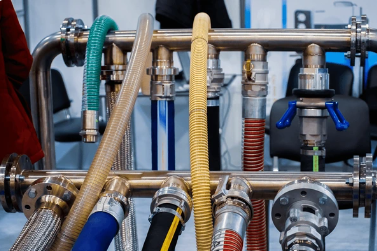
What is the Best Hose to Use? Finding the Perfect Match for Your Job
Share
Are you asking yourself what is the best hose to use? Choosing the right hose can be as crucial as picking the right tool for any job. Whether you're watering your garden, cleaning your car, or dealing with industrial tasks, the right hose can make a significant difference in efficiency and ease of use. In this guide, we’ll break down the types of hoses available and help you match them with your specific needs.
1. Garden Hoses: What is the best hose to use
When it comes to garden hoses, there’s no one-size-fits-all solution. The best hose to use for your garden depends on factors such as length, material, and flexibility.
Materials:
- Rubber Hoses: Known for their durability and resistance to kinks and temperature extremes, rubber hoses are excellent for heavy-duty use and are often favored by gardeners and professionals.
- Vinyl Hoses: These are lighter and more affordable but may not last as long as rubber hoses. They’re suitable for general garden use and light tasks.
- Polyurethane Hoses: These are highly flexible, lightweight, and resistant to kinking. They’re also easier to handle and store, making them a popular choice for casual gardeners.
Length and Diameter:
- Length: Common lengths range from 25 to 100 feet. Choose a length that covers your garden’s area without excessive coiling or stretching.
- Diameter: Hoses come in various diameters, typically from 1/2 inch to 3/4 inch. Larger diameters allow for higher water flow, which is useful for watering large areas or using sprinkler systems.
Features to Consider:
- Kink Resistance: Look for hoses with features or materials designed to reduce kinking.
- Expandable Hoses: These hoses expand when filled with water and contract when empty, making them easy to store and handle.
2. Pressure Washer Hoses: What is the best hose to use
If you’re dealing with tough cleaning jobs, a pressure washer hose is essential. These hoses are designed to handle high-pressure water jets, so durability and flexibility are key.
Materials:
- Rubber and Synthetic Blends: These are the most durable options, capable of withstanding high pressures and various weather conditions. They’re also less likely to kink under pressure.
- PVC: While generally less durable than rubber, PVC hoses are a cost-effective option for lighter pressure washing tasks.
Pressure Rating: Always check the pressure rating of the hose to ensure it matches or exceeds the pressure output of your pressure washer. Mismatching can lead to hose failure and potential injury.
3. Industrial Hoses: What is the best hose to use
For industrial applications, the demands are much greater. Industrial hoses must handle extreme conditions, including high pressures, temperatures, and abrasive materials.
Types of Industrial Hoses:
- Hydraulic Hoses: Designed for high-pressure hydraulic systems, these hoses must be capable of handling high pressure and are typically reinforced with braided steel.
- Chemical Hoses: These are specifically made to handle chemicals and acids. They are often lined with materials like Teflon or rubber to resist corrosion and degradation.
- Air Hoses: Used for pneumatic tools, these hoses are built to handle compressed air and usually feature a high burst pressure rating.
Features to Consider:
- Reinforcement: Many industrial hoses are reinforced with steel or synthetic fibers to handle high pressure and prevent bursting.
- Temperature Tolerance: Ensure the hose material can withstand the temperatures it will be exposed to, whether hot or cold.
4. Specialty Hoses: What is the best hose to use
There are also hoses designed for specific uses that don't quite fit into the general categories above.
Drip Irrigation Hoses: Perfect for efficient watering directly at the root level, these hoses are ideal for gardens and agriculture.
Fire Hoses: These must be made of durable, high-pressure resistant materials and often come with specialized fittings and nozzles.
Conclusion
When you are asking yourself what is the best hose to use, selecting the right hose involves understanding your specific needs and the characteristics of each type of hose. With the right hose in hand, you won't need to ask what is the best hose to use anymore and you’ll tackle your tasks with ease and efficiency.
Happy hosing!
